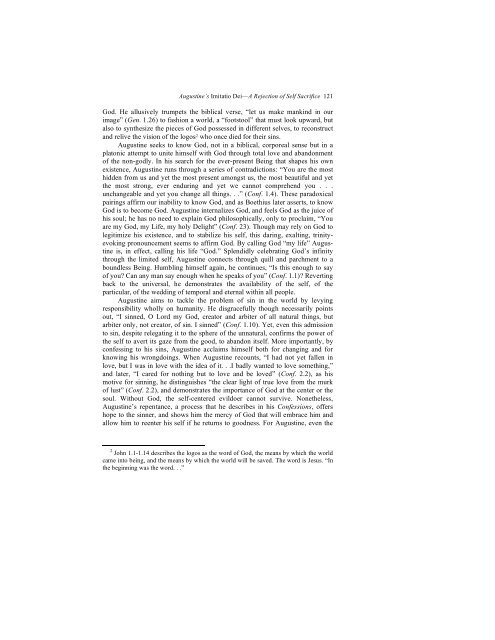You also want an ePaper? Increase the reach of your titles
YUMPU automatically turns print PDFs into web optimized ePapers that Google loves.
Augustine’s Imitatio Dei—A Rejection of Self Sacrifice 121<br />
God. He allusively trumpets the biblical verse, “let us make mankind in our<br />
image” (Gen. 1.26) to fashion a world, a “footstool” that must look upward, but<br />
also to synthesize the pieces of God possessed in different selves, to reconstruct<br />
and relive the vision of the logos 2 who once died for their sins.<br />
Augustine seeks to know God, not in a biblical, corporeal sense but in a<br />
platonic attempt to unite himself with God through total love and abandonment<br />
of the non-godly. In his search for the ever-present Being that shapes his own<br />
existence, Augustine runs through a series of contradictions: “You are the most<br />
hidden from us and yet the most present amongst us, the most beautiful and yet<br />
the most strong, ever enduring and yet we cannot comprehend you . . .<br />
unchangeable and yet you change all things. . .” (Conf. 1.4). These paradoxical<br />
pairings affirm our inability to know God, and as Boethius later asserts, to know<br />
God is to become God. Augustine internalizes God, and feels God as the juice of<br />
his soul; he has no need to explain God philosophically, only to proclaim, “You<br />
are my God, my Life, my holy Delight” (Conf. 23). Though may rely on God to<br />
legitimize his existence, and to stabilize his self, this daring, exalting, trinityevoking<br />
pronouncement seems to affirm God. By calling God “my life” Augustine<br />
is, in effect, calling his life “God.” Splendidly celebrating God’s infinity<br />
through the limited self, Augustine connects through quill and parchment to a<br />
boundless Being. Humbling himself again, he continues, “Is this enough to say<br />
of you? Can any man say enough when he speaks of you” (Conf. 1.1)? Reverting<br />
back to the universal, he demonstrates the availability of the self, of the<br />
particular, of the wedding of temporal and eternal within all people.<br />
Augustine aims to tackle the problem of sin in the world by levying<br />
responsibility wholly on humanity. He disgracefully though necessarily points<br />
out, “I sinned, O Lord my God, creator and arbiter of all natural things, but<br />
arbiter only, not creator, of sin. I sinned” (Conf. 1.10). Yet, even this admission<br />
to sin, despite relegating it to the sphere of the unnatural, confirms the power of<br />
the self to avert its gaze from the good, to abandon itself. More importantly, by<br />
confessing to his sins, Augustine acclaims himself both for changing and for<br />
knowing his wrongdoings. When Augustine recounts, “I had not yet fallen in<br />
love, but I was in love with the idea of it. . .I badly wanted to love something,”<br />
and later, “I cared for nothing but to love and be loved” (Conf. 2.2), as his<br />
motive for sinning, he distinguishes “the clear light of true love from the murk<br />
of lust” (Conf. 2.2), and demonstrates the importance of God at the center or the<br />
soul. Without God, the self-centered evildoer cannot survive. Nonetheless,<br />
Augustine’s repentance, a process that he describes in his Confessions, offers<br />
hope to the sinner, and shows him the mercy of God that will embrace him and<br />
allow him to reenter his self if he returns to goodness. For Augustine, even the<br />
2 John 1.1-1.14 describes the logos as the word of God, the means by which the world<br />
came into being, and the means by which the world will be saved. The word is Jesus. “In<br />
the beginning was the word. . .”

















